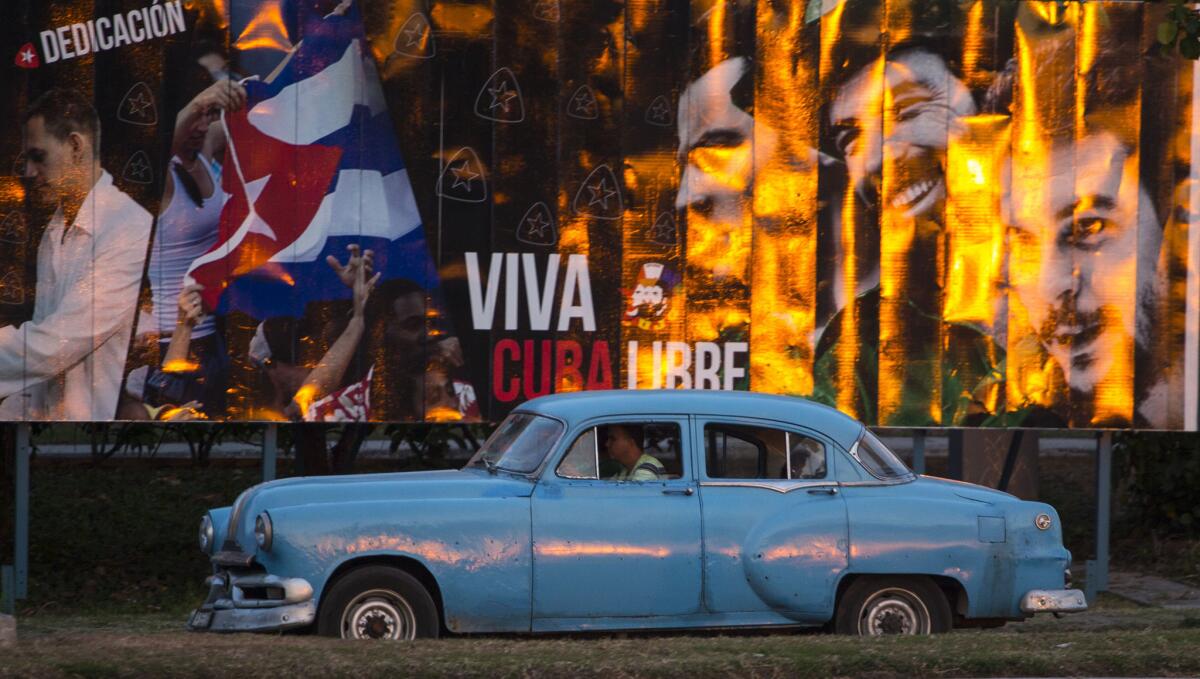Obama makes travel to Cuba easier and lifts financial restrictions on Havana

A cabdriver in a classic American car passes a billboard that reads in Spanish, “Long live free Cuba,” in Havana on March 14.
- Share via
Reporting from Washington — The White House moved Tuesday to ease major restrictions on Americans traveling to Cuba and on Cuba’s use of U.S. dollars for international transactions, announcing the shift as President Obama prepares to make an historic trip to Havana next week.
The new rules mean Americans will be allowed to visit Cuba on their own, instead of on expensive group tours, as long as they declare that the trip is to learn about Cuban people and culture.
Although tourism is still officially barred under the U.S. trade embargo, travel will be permitted for almost any cultural activity, including musical performances, art appreciation and baseball games. Tourists may be able to declare their plans while booking on a travel website.
See more of our top stories on Facebook >>
The Obama administration has steadily loosened bans on trade and travel to Cuba over the last year as part of a push to normalize relations with the former Cold War adversary before the president leaves office.
The latest decision, issued under Obama’s executive authority, perhaps is the most significant for Americans seeking to visit the island nation and for U.S. airlines, hotels and financial institutions seeking to operate there.
Havana and Washington in August restored diplomatic relations that had been broken for more than half a century. White House officials said Tuesday that broadening personal and commercial ties will help bridge the people-to-people gap that remains.
Those relationships will do more for Cuban liberty than any official U.S. action, said Ben Rhodes, the Obama deputy national security advisor who has helped broker the detente with Havana.
“This is in America’s national interest,” Rhodes said, “and represents the best way for us to improve opportunities for the Cuban people.”
The changes were announced five days before Obama becomes the first sitting U.S. president to set foot in Cuba since Calvin Coolidge in 1928. Obama is expected to meet President Raul Castro, but not former President Fidel Castro.
Obama’s March 20-22 visit remains controversial because of concerns about communist-run Cuba’s human rights abuses and its state-run economy. Congress continues to maintain a trade embargo on Cuba, and some lawmakers staunchly oppose the thaw with Havana.
NEWSLETTER: Get the day’s top headlines from Times Editor Davan Maharaj >>
But some U.S. business interests, including banks and professional baseball, have welcomed the easing of restrictions.
The new rules will allow Cubans to open U.S. bank accounts and allow Cubans living in the United States to earn a salary or compensation.
Major League Baseball is in talks with the Cuban government to let players sign directly with its teams, rather than flee Cuba and seek political asylum in the U.S.
The league still hasn’t resolved differences with Cuban authorities, however, including how many players can be drafted for U.S. teams and whether they also can compete in the Cuban summer leagues, according to American officials familiar with the talks.
Obama’s critics see the latest easing of restrictions as further concessions to an abusive government, not help for the Cuban people.
“These unilateral actions will further prop up a communist regime in Cuba that has a long record of brutal human rights abuse,” Rep. Ed Royce (R-Fullerton), chairman of the House Foreign Affairs Committee, said in a statement.
“While the Castros and their agents are given access to the U.S. financial system, the suffering Cuban people will still get paid in funny money — if at all. Workers at foreign-owned resorts receive only a fraction of their salary, sometimes as little as five percent. The government pockets the rest.”
Advocates of normalizing U.S. ties to Cuba welcome the changes.
“This is what historic change looks like,” said James Williams, president of Engage Cuba, an umbrella public policy organization. “The new regulations will speed up a process that is now all but inevitable. It will lift important obstacles to the full normalization of relations.”
The bar on Cuba from using U.S. dollars in international transactions was one of Havana’s chief gripes. Cuban authorities contended that the prohibition was incongruent with normal relations.
Cuba has dollars because of remittances from Cuban workers and families overseas and spending by foreign tourists in Havana and other destinations.
The government is forced to exchange dollars for euros or other currencies on the international market, a step that made trade more costly. The new rules open international banking to Cuba and to commerce with dollars.
Until now, it was illegal to pay a Cuban citizen working in the U.S. more than his or her living costs. University professors who taught here, musicians who toured here, even athletes playing for U.S. teams could not receive fair wages unless they defected. They now will receive a normal salary.
The shift in travel is perhaps the most dramatic. American travelers to Cuba still must be able to present U.S. customs and border agents with an itinerary showing educational or other approved pursuits, but most experts don’t expect U.S. authorities to enforce the remaining restriction.
“They’ve essentially deregulated travel,” said Robert Muse, a Washington attorney who specializes in U.S. laws regarding Cuba. “This is a standing invitation to travel to Cuba for U.S. tourists.”
ALSO
L.A. area has the worst traffic in America. Again
Latest storms are filling reservoirs and bringing hopes of a ‘March miracle’
Civilians are trapped and the dead lie unburied as fighting rages in Turkey’s Kurdish heartland
More to Read
Sign up for Essential California
The most important California stories and recommendations in your inbox every morning.
You may occasionally receive promotional content from the Los Angeles Times.












